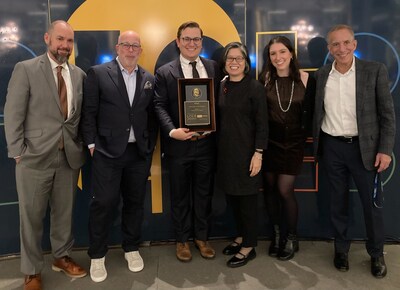
BOSTON, Oct. 10, 2025 /PRNewswire/ — STAT addiction reporter Lev Facher won a 2025 Loeb Award, the highest honor in business and financial journalism, on Thursday evening for explanatory reporting for his series “The War on Recovery.” The six-part series exposed how the U.S. denies lifesaving medications to people with opioid addiction.
This is the second year in a row, and the third time in STAT’s 10-year history, that the publication has won a Loeb. Facher was presented with the award at a ceremony held at the Rainbow Room at Rockefeller Center in New York.
In accepting the honor, Facher said, “‘The War on Recovery’ is about the fact that Americans have largely given up on solving our opioid crisis. While other countries work hard to provide access to these lifesaving medications, the U.S. works even harder to restrict access. I hope this series can play a small role in reminding us that we’re living through the deadliest drug epidemic in human history, and in inspiring both government and the private sector to act.”
STAT also was honored with two finalists: Adam Feuerstein for commentary for “Adam Feuerstein: Truth-Teller on the Biotech Industry,” and Casey Ross, Lizzy Lawrence, Bob Herman, and Tara Bannow in the beat reporting category for “Health Care’s Colossus,” a series revealing how UnitedHealth Group wields its unrivaled physician empire to boost its profits and expand its influence.
The Boston Globe, STAT’s sister publication, won a Loeb in the local category for its Steward Health Care investigation, which uncovered extensive financial mismanagement and showed how Steward’s owners profited handsomely as the company collapsed — with deadly consequences.
The first STAT winner of a Loeb Award was Ed Silverman, who in 2018 won for commentary for his “Pharmalot View” column.
Last year, Casey Ross and Bob Herman — who were among the finalists this year — won the 2024 investigative prize for “Denied by AI: Consequences for Sick and Vulnerable Americans.” The series revealed an explicit strategy by the nation’s largest health insurer to use a flawed computer algorithm to cut off care for seniors, increasing profits in its Medicare Advantage business at the expense of vulnerable older Americans.
Facher’s series challenges the myth that the opioid crisis is intractable. In truth, methadone and buprenorphine could prevent tens of thousands of deaths annually. The series documented the harms of draconian methadone protocols, the refusal of jails and recovery programs to offer medication, and the myths equating these drugs with heroin. The investigation also revealed that private equity firms now own roughly one-third of U.S. methadone clinics, and that the clinic chains backed by private equity have lobbied to maintain their exclusive right to provide the medication and oppose reforms that would bring U.S. methadone policy in line with that in other Western countries.
The series was edited by STAT’s editorial director, Laura Chang, and included additional multimedia and editing support from across STAT’s newsroom, including video from senior multimedia producer Alex Hogan and interactive data visualizations from data editor Emory Parker.
“We are especially proud of this recognition because in the past, reporting focused on the opioid crisis was often defeatist,” said Rick Berke, STAT’s co-founder and executive editor. “‘The War on Recovery’ is anything but: It illustrates a vision for an alternate American reality in which our response to the drug overdose crisis is rooted in evidence, best practice, and the strategies known to be most effective at saving lives.”
The series sparked two congressional inquiries into the private equity-backed methadone clinics at the center of STAT’s reporting. In a letter to one clinic chain, a bipartisan group of lawmakers led by Sen. Edward Markey (D-Mass.) wrote, “We are concerned that there is incompatibility manifesting itself in private-equity-backed OTPs [opioid treatment programs] seeking to maintain their monopoly on methadone access, not because it is good for the patient, but because it is good for the bottom line.”
The series inspired a research project at Harvard and Virginia Commonwealth University, was included in public policy courses, led to commentary from addiction experts, and has been widely cited at academic conferences. The series also inspired a Boston Globe editorial, radio, and television segments.
Last year, STAT was also honored at the Loeb banquet as a finalist in the explanatory category for its yearlong series, “The Obesity Revolution.” It chronicled the rise of a new class of weight-loss-inducing drugs and their potential to transform patients’ lives for the better — but also to worsen inequities, increase anti-fat bias, strain national health spending, and make billions for drug companies. The reporters cited were Elaine Chen, Megan Molteni, Nicholas Florko, Isabella Cueto, and Matthew Herper.
Facher started at STAT as a Washington reporter in 2016 and has covered addiction since 2022. “The War on Recovery” has received other major recognition this year, including first place in the AHCJ Awards for Excellence in Health Care Journalism in the health policy category, and as a Livingston Award finalist for national reporting.
The Loeb Awards were established in 1957 by Gerald Loeb, a founding partner of E.F. Hutton, and they have been presented by the UCLA Anderson School of Management since 1973. Find the full list of The Loeb Award winners here and view all of STAT’s recent awards here.
Contact: Boston Globe Media Communications, 617-851-3396, [email protected]
About STAT:
Founded in 2015, STAT is a digital media company that focuses on delivering fast, deep, and tough-minded journalism about health, medicine and the life sciences. STAT takes you inside academic labs, biotech boardrooms, and political backrooms, casting a critical eye on scientific discoveries, scrutinizing corporate strategies, and chronicling the roiling battles for talent, money, and market share. With an award-winning newsroom, STAT provides indispensable insights and exclusive stories on the technologies, personalities, power brokers, and political forces driving massive changes in the life sciences industry — and a revolution in human health.
STAT has twice been named a Pulitzer Prize finalist and has won a number of prestigious journalism prizes.
STAT is affiliated with Boston Globe Media, and its headquarters is in Boston. It also has reporters in Washington, D.C., New York City, London, Los Angeles, San Francisco, San Diego, Chicago, and Minneapolis.
About Boston Globe Media:
Boston Globe Media Partners, LLC is a locally owned, award-winning media company serving Boston and New England for over 153 years. Its cornerstone is The Boston Globe, a 27-time Pulitzer Prize-winning news source and one of the most successful metro news organizations in the United States. The Globe is headquartered in Boston with regional bureaus in Washington, D.C., Rhode Island, and New Hampshire. The Globe has been successfully growing its direct subscriber base, today boasting the highest total number of subscribers the organization has had since 2008. The Globe hosts events that connect community members to its journalism and provides a range of digital and home-delivered advertising solutions that reach more consumers than any other New England media brand. Boston Globe Media’s portfolio includes The Boston Globe, Globe Opinion, Boston.com, STAT, The B-Side, Globe Publishing Services, Globe Events, Studio/B, and Boston magazine.
View original content to download multimedia:https://www.prnewswire.com/news-releases/stat-wins-2025-loeb-award-for-explanatory-reporting-302581073.html
SOURCE STAT






